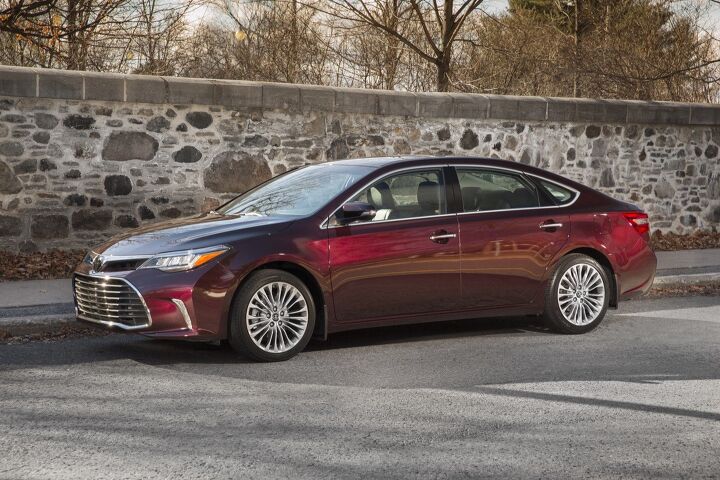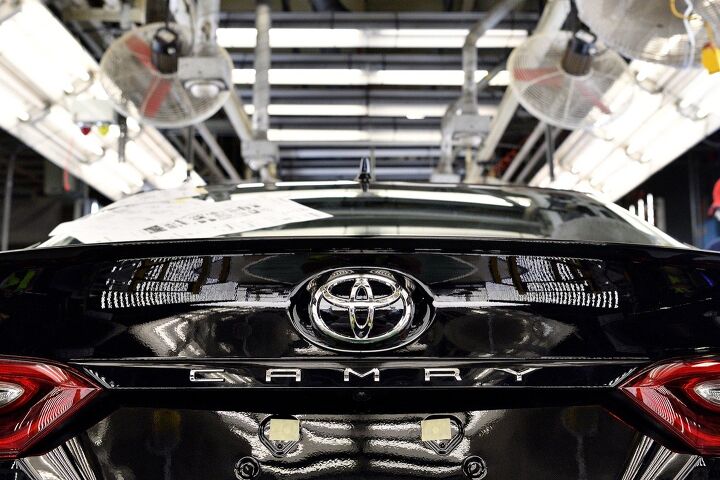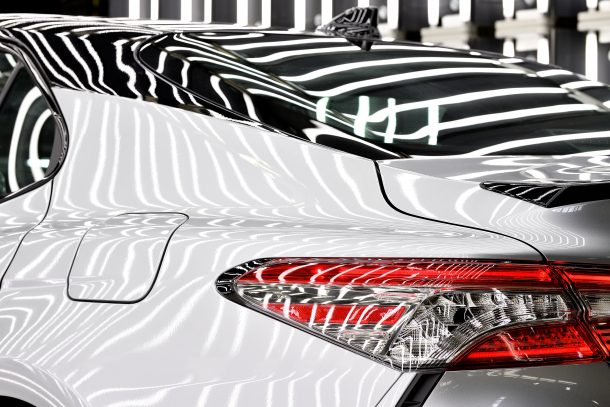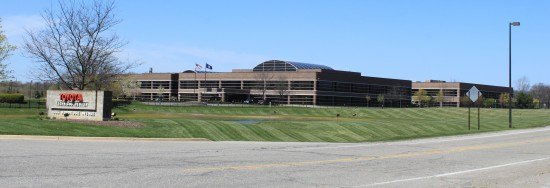#ToyotaKentucky
Full-size Sedan Faithful, Take Heart - Fifth-gen Toyota Avalon Due Next Year; Toyota Says "We're Committed"
U.S. sales of full-size, volume-brand sedans fell 17 percent in the first seven months of 2017, a sharp drop following noteworthy declines in each of the last three years. Despite the growth the market has seen since the auto industry’s collapse in 2009, big sedans have lost 37 percent of their U.S. sales volume over the last four years.
Compared with 2013, that’s 18,000 fewer sales for the segment every month. Even compared with 2016, that’s 6,500 fewer sales every month.
In what was historically a fleet-dependent corner of the passenger-car market, many automakers’ reduced emphasis on sales to daily rental companies plays a major role. Numerous players in the segment also attempted to move upmarket, further away from the midsize cars that now offer the requisite interior volume. It hasn’t turned out so well for some. Remember the Mitsubishi Diamante and Mercury Montego? We’ll soon forget the discontinued Hyundai Azera. The Ford Taurus is likely not long for this market, either.
Yet in a market that’s lost 17 percent of its sales this year, the Toyota Avalon has shed 28 percent of its year-to-date volume, a loss of 7,475 sales. With an all-new 2018 Camry set to generate more than its fair share of Toyota sedan sales, does the Avalon even deserve a place in Toyota’s 2018 lineup?
Indeed it does, as Toyota will launch the fifth-generation, TNGA-based Avalon in 2018. “We’re committed to Avalon,” says Toyota North America’s executive vice president for sales, Bob Carter.
All of the New 2018 Toyota Camrys Sold in America in July Were Japan Imports
We learned early in July that many of the early 2018 Toyota Camrys available in Toyota’s U.S. showrooms wouldn’t be built in Toyota’s Georgetown, Kentucky, assembly plant.
Through June, not a single one of the 2016 and 2017 Camrys sold in America were imported. But all of the 2018 Toyota Camrys sold in July came across the Pacific from Japan.
Granted, most of the Camrys leaving Toyota showrooms are still old new Camrys, not new new Camrys.
The Next Toyota Avalon Is TNGA, Assuming the Next Avalon Is
Stiffer structures, a lower center of gravity for improved handling, more shared components, and a 20-percent cost cut are all benefits of the Toyota New Global Architecture. Eventually, Toyota wants all of its front-wheel-drive vehicles to use TNGA as a starting point.
You first witnessed TNGA in the 2016 Toyota Prius, then in the 2018 Toyota C-HR, and most recently in the 2018 Toyota Camry that’s trickling into dealers now.
But beyond the ability to improve existing nameplates and spawn dramatically different new cars, TNGA is also intended to improve plant efficiency. Yet a massive shift at Toyota’s Georgetown, Kentucky assembly plant, detailed by Wards Auto, hasn’t yet resulted in the efficiency rewards.
“When we change over in the future with the Avalon, we’ll be able to pull that efficiency out of (the operation),” Toyota Motor Manufacturing Kentucky president Wil James told Wards.
Ah yes, Avalon. How could we forget?
Toyota Claims New Camry Represents an Evolution for the Entire Company
Toyota is claiming that its TNGA modular platform represents more than a sea change for the Camry. It points to an entirely new direction for the company as a whole, highlighting its commitment to American manufacturing and a future involving more exciting vehicles.
While the latter remains to be seen, the Toyota New Global Architecture has warped the company’s midsize sedan into something almost unrecognizable. With substantially “more-aggressive” styling, the Camry is also boasting efficiency and performance gains — thanks to the platform’s low center of gravity and increased rigidity. But Toyota doesn’t want to keep the technology limited to America’s best-selling sedan, the architecture and concept are set to be baked into future vehicles as well. Because what good is cost-saving modular platform if you are only use it on a single model?
Toyota Truly Believes 2018 Camry Will Do For Midsize Sedans What Tacoma Did For Midsize Trucks; Kentucky Plant Employment At All-Time High
Excited at the prospect of an all-new midsize sedan despite a drastic decrease in demand for midsize sedans, Toyota is ramping up employment at the Camry’s assembly plant in Georgetown, Kentucky.
With 700 additional manufacturing workers helping to launch the 2018 Toyota Camry, employment at Toyota’s Kentucky facility grew to 8,000, more than at any point in the plant’s three-decade history.
Toyota also builds Avalons and Lexus ES350s in Georgetown. (The Venza, a former Georgetown wagon, is dead.) But it’s the Camry, especially this all-new 2018 Camry, that will bring glory to the Kentucky plant if glory can indeed be brought.
Jack Hollis, the Toyota division’s group vice president and general manager, strongly believes the Camry is the beginning of a pro-sedan wave in America. In an extended interview with Autoline, Hollis spoke highly of the 2018 Camry’s potential, and of the potential for the entire car sector once the Camry stimulates demand.
“I think you’re going to see the entire sedan market pick up,” Hollis told Autoline, before hedging only a bit. “We’ll see a year from now.”
Details on Toyota North American Reorganization: California & Kentucky Lose, Texas & Michigan Gain
Toyota has released a statement (below the fold) on the reorganization of its North American business operations and the consolidation of most of those functions at a new regional headquarters to be built in Plano, Texas. Approximately 4,000 employees of four different business units will be relocated, mostly to Texas, though some functions will be relocated to Toyota facilities in Georgetown, Kentucky and near Ann Arbor, Michigan. Toyota Motor Sales, U.S.A. and Toyota Financial Services in Torrance, Calif., Toyota Motor Engineering and Manufacturing North America in Erlanger, Ky., and Toyota Motor North America in New York City will be moved between now and early 2017, when the Plano campus and new facilities near Ann Arbor and Georgetown are expected to be completed.





















Recent Comments